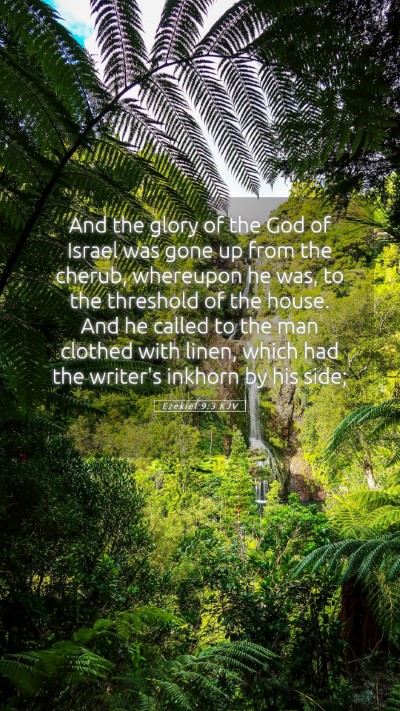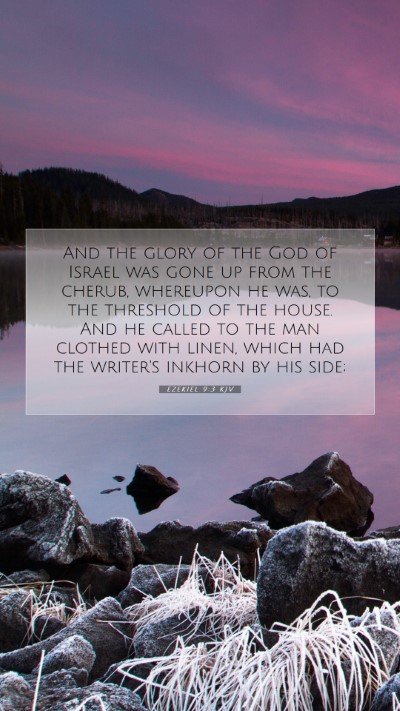Ezekiel 9:3 - Understanding the Scripture
Ezekiel 9:3 states: "And the glory of the God of Israel was gone up from the cherub, whereupon he was, to the threshold of the house. And he called to the man clothed with linen, which had the writer's inkhorn by his side."
Bible Verse Meaning
This profound verse marks a significant moment in Ezekiel's prophetic vision. The departure of the glory of the Lord from the cherub signifies a withdrawal of divine presence from the temple, signaling impending judgment on Jerusalem. Commentaries from Matthew Henry, Albert Barnes, and Adam Clarke collectively emphasize that this action symbolizes God's displeasure due to the sinful practices of the people and foreshadows the calamity that will befall them.
Bible Verse Interpretations
-
Matthew Henry: Henry notes that the visibility of God's glory departing demonstrates the seriousness of the Israelites' transgressions. It conveys that God's presence will remove itself when His holiness is compromised by sin.
-
Albert Barnes: Barnes elucidates that the "man clothed with linen" indicates a divine messenger tasked with recording the deeds of the people, underscoring the accountability each individual holds before God.
-
Adam Clarke: Clarke highlights the importance of the "inkhorn" which signifies preparation for judgment, where the faithful are marked for salvation as the unfaithful face destruction.
Scripture Analysis
The act of God's glory leaving the cherub necessitates an in-depth biblical exegesis to fully comprehend the weight of the scene described in Ezekiel 9:3. This detail historically resonates with the temple's significance as the dwelling place of God's glory among His people. Understanding this context is crucial for grasping the broader implications of God's judgment and mercy.
Historical Context of Ezekiel
Ezekiel's ministry took place during Babylonian exile, a period marked by significant turmoil for the Israelites. The abandonment of the temple's glory represented not just loss, but a transition into a new phase of divine interaction with humanity. As such, Ezekiel's visions serve as both warnings and proclamations of hope for eventual restoration.
Application of the Verse
For modern readers, Ezekiel 9:3 serves as a reminder of the importance of remaining in fellowship with God through righteousness. The verse challenges individuals seeking to understand scripture deeply by prompting them to consider their own lives in light of God's holiness.
- Reflect upon personal accountability before God.
- Engage in self-examination regarding spiritual practices.
- Consider ways to seek God's glory and presence actively.
Related Bible Cross References
- 1 Samuel 4:21-22: Discusses the departure of God's glory from Israel.
- Ezekiel 10:18: Describes God's glory leaving the temple.
- Psalm 78:60-61: Mentions God abandoning His dwelling for the people’s unfaithfulness.
Conclusion
Ezekiel 9:3 encourages a comprehensive approach to Bible study, emphasizing the significance of understanding biblical text within context. Through careful scripture analysis, the meaning of this verse can be seen as a reflection of God's unchanging nature toward holiness, righteousness, and the call to repentance.
Such interpretations of biblical verses allow for growth in spiritual understanding and are essential in Bible study groups and personal devotions. Engaging with resources and guides can enhance these insights, leading deeper into the meaning of the Scriptures.


